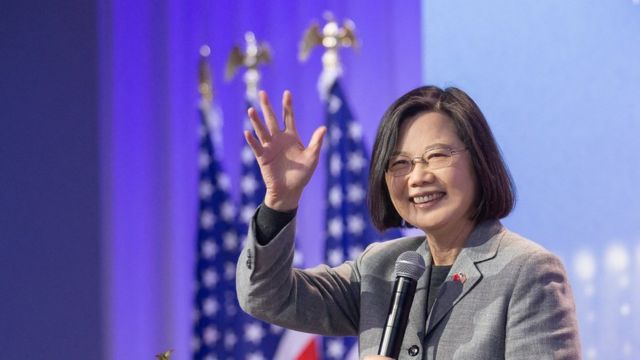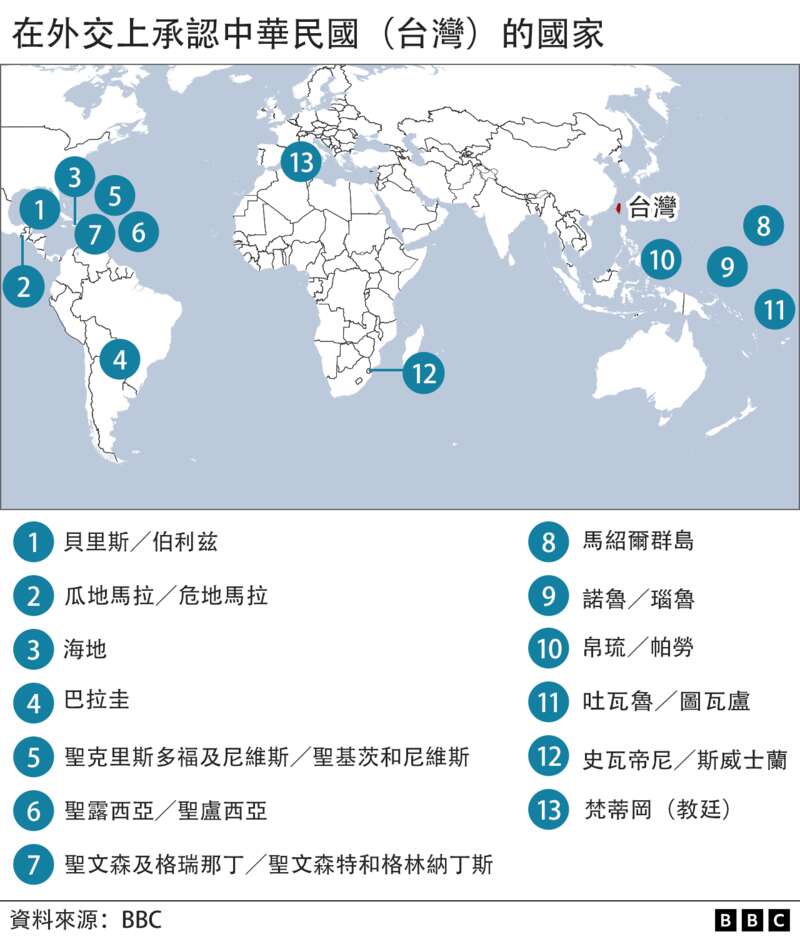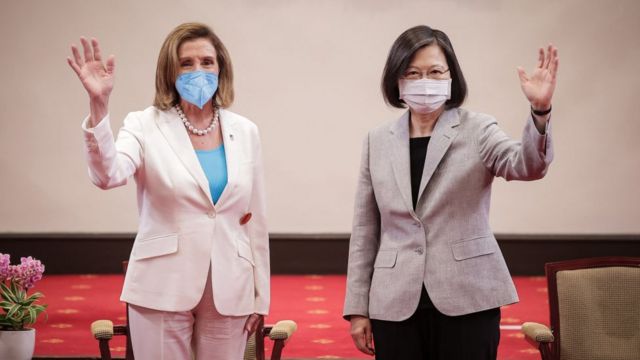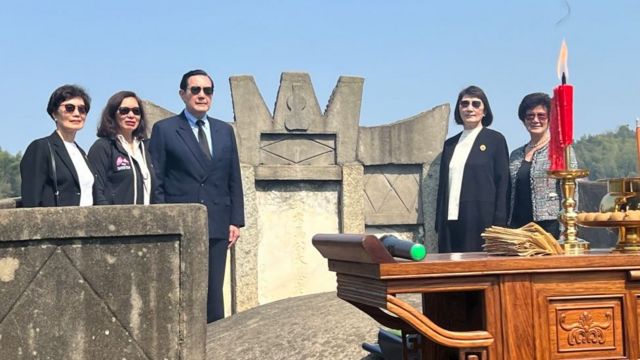风萧萧_Frank
以文会友蔡英文会晤麦卡锡:美国“爱杀”置台湾于险境?
BBC |2023-04-05
台湾正处于一场危险的三角恋中央。
上周,纽约欢迎台湾总统蔡英文到访,现在她将要降落加利福尼亚州,而在这里,她将受美国国会众议院议长麦卡锡(Kevin McCarthy)款待,两人将面谈。
这显然不是巧合。美国敌视中国之情绪正在加深、加剧,而这正促使美方更公开地展示对台湾的支持,共和、民主两党彼此争先恐后。
蔡英文稍早前在美国纽约接受一领袖奖项。
前众议院议长佩洛西(Nancy Pelosi)去年夏天不顾一切到访台北,纵然引来了北京的暴怒反应,可事出有因。
前美国在台协会台北办事处处长司徒文教授(Prof William Stanton)说:“我个人很反对佩洛西访问一事。”
“一位美国高级政治人物访问宝岛,犹如踹了中国一脚,却没得到什么好处。后果还蛮吓人的。”
中国导弹飞越台湾岛,北京作出令人毛骨悚然的威胁。区内各国政府开始认真地讨论中国入侵台湾的时间表。
即便如此,麦卡锡今年1月当选众议院议长后,来自共和党的他公开表明要以佩洛西为榜样。但司徒文教授说,蔡总统认为这不是个好主意。
他说:“我想麦卡锡显然想跟佩洛西齐名,但蔡英文说:‘谢了。我们改在加州喝茶如何?’”
也许蔡总统还不想再有一位美国领袖来访,惹着争议,但她同时得向中国大陆表明,要想切断台北民选政府与其再华盛顿的最强盟友并不会得逞。
这就是加州会晤的由来。纵然中国警告美国,这是“在台湾问题上玩火”,麦卡锡先生也没打算淡化它,并称这是“跨党派”会晤。
澳大利亚国立大学的政治学者宋文笛认为,所谓的“过境外交”对台湾来说非常重要。
中国近年相继成功猎获台湾的几个正式盟友,使承认台北的政府数目削减至13个。
宋文笛说:“这些外访符合台湾社会对国际认同的需要。缺乏国际承认下,这些其他替代宣示来表达支持,对台湾人一样重要。”
去年8月,佩洛西(左)到访台湾,北京强烈表达不满。
另一边厢,透过邀请蔡英文的前辈马英九访问大陆,中共也在发动其魅力攻势。
马先生开展了一场前所未有的五城之旅。虽然表面上是回乡祭祖,他也确实拜谒了华中的祖坟,但这还是一次政治旅程。这实际上是自1949年中华人民共和国成立以来,首次有台湾前总统来访。
宋文笛说:“北京试图软化对台步调……争取更多民心,同时避免在(2024年)总统竞选期间出现台湾民族主义浪潮。”
他补充说,马英九访问大陆正好为此提供了必要的“政治掩护”。
上周他抵达南京之际,马英九惊人地发表了一段政治味道浓重的演说:“两岸人民同属中华民族,都是炎黄子孙。”
司徒文教授说:“北京礼待马英九,因为他代表让步。他说‘我们同属中华民族’,这是他跟北京都认同的,却不是台湾人都认同的。”
马英九的策略有其风险:一些民调显示,超过60%台湾居民形容自己是台湾人,而非中国人。
宋文笛则指出,这其中也有甜头在等待着。另一些民调显示,超过一半台湾人认为现在跟中国大陆打仗的可能性增大,马英九志在说服台湾选民,只有他的政党——中国国民党——能避免战争。
“这全是为了巩固他作为台海两岸桥梁的政治遗产,而在地方政治层面,台湾正要开始总统竞选,国民党的论调是他们能跟中国谈和平。”
然而,眼前的烫手山芋是台湾两位“追求者”之间——华盛顿与北京——关系日趋恶化。美国智库德国马歇尔基金会亚洲主任葛来仪(Bonnie Glaser)认为,自中美1979年互相承认以来,两国关系从未如此不堪。
她说:“他们(北京)都不接拜登总统或者是五角大楼(美国国防部)的电话,国会已宣告中国是个生存威胁(existential threat)。”
几十年来,华盛顿如履薄冰地维持着一种现状:承认但不公开支持北京“世上只有一个中国政府”——在大陆的那个——的立场。自1979年以来,它跟那个政府而非台湾维持正是关系,但同时继续当台北的坚实盟友,承诺协助台湾自卫。
令人生恐的是,中国如今相信美国想要改变现状,而两岸现状得以让台湾海峡保持和平40年。
葛来仪说:“拜登总统告诉习近平,他并无将台湾当成武器,他不支持台湾从中国分裂出去。”
但她指出,在台湾领导人进行备受争议的官式访问与会面之际,这样的保证意义不大。
在马英九周游中国大陆与蔡英文在加州喝茶之际,台湾还得盼望习近平能愿意接电话。
Is Taiwan in danger of being loved to death?
Taiwan is caught in the middle of a dangerous love triangle.
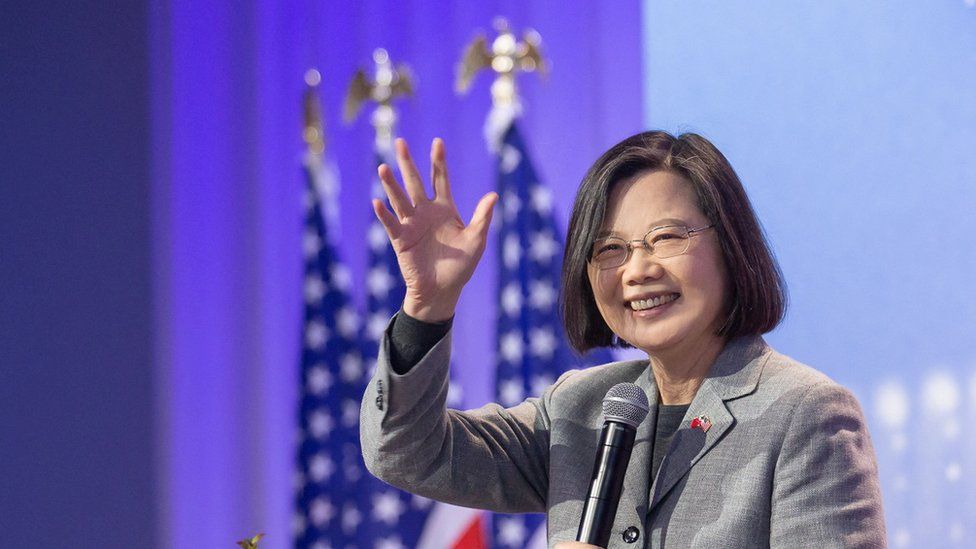 Taiwan President Tsai Ing-wen was in New York to receive a leadership award
Taiwan President Tsai Ing-wen was in New York to receive a leadership award
The timing is hardly a coincidence. In the US there is deep and growing hostility to China. And this is driving ever more open displays of support for Taiwan, with Democrats and Republicans competing to out-do each other.
It's a big reason former House Speaker Nancy Pelosi was so keen on landing in Taipei last summer, despite the fact that it set off a furious reaction from China. The self-governed island, which Beijing claims as part of its territory, is arguably the biggest flashpoint between the US and China.
"I was personally very opposed to the Pelosi visit," says professor William Stanton, former director of the American Institute in Taiwan. "For a high-level politician from the US to make a visit to the island was just poking China without much reward. And the consequences were quite scary."
Chinese missiles flew over the island as Beijing made blood-curdling threats. In capitals around the region governments began talking seriously about the timetable for a Chinese invasion of Taiwan.
Despite that, as soon as he was elected house speaker this January, Mr McCarthy, a Republican, declared his intention to follow Ms Pelosi's example. But President Tsai decided that was not a good idea, Prof Stanton says.
"I think it was quite clear that Kevin McCarthy wanted to pull a Pelosi," he says. "But Tsai Ing-wen said, 'no thank you, how about we have tea together in California instead'."
President Tsai may not want another contentious visit by a US leader to Taiwan just yet - but she also needs to show China that it will not succeed in shutting down contact between a democratically-elected government in Taipei and its most powerful ally in Washington.
And so, the meeting in California. Mr McCarthy has far from downplayed it, calling the meeting "bipartisan", despite China's warning that the US was "playing with fire on the Taiwan question".
This so-called "transit diplomacy" is crucial for Taiwan, says Wen-Ti Sung, a political scientist at the Australian National University.
Over the years, China has successfully poached many of Taiwan's formal allies, whittling down the number of governments that recognise Taipei to just 13.
"These international visits match Taiwan society's needs for international recognition," Mr Sung says. "When there's an absence of international recognition, these other proxy indicators of international support are important to [the] Taiwanese."
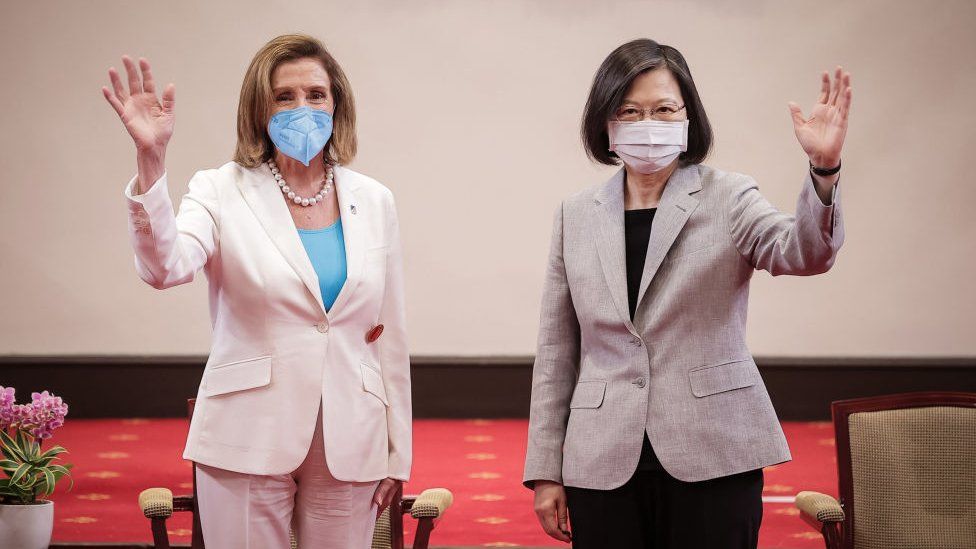 Former US House Speaker Nancy Pelosi's visit to Taiwan enraged Beijing
Former US House Speaker Nancy Pelosi's visit to Taiwan enraged Beijing
Meanwhile the Communist Party of China has mounted its own charm offensive, by inviting President Tsai's predecessor, Ma Ying-jeou, to tour the mainland.
Mr Ma went on an unprecedented five-city tour, ostensibly to pay homage to his ancestors. He has indeed visited their graves in central China. But the trip is also political. In fact, it's the first time a former president of Taiwan has ever been invited to the People's Republic of China since its founding in 1949.
"Beijing is trying to soften the tone towards Taiwan... winning more hearts and minds, and also avoiding a surge of Taiwanese nationalism during the [2024] presidential campaign," Mr Sung says.
Mr Ma's visit, he adds, provided the necessary "political cover" to do that.
When he landed in Nanjing last week, Mr Ma made a strikingly political speech: "The people on both sides of the Taiwan Strait are Chinese. And both are descendants of the Yan and Yellow Emperors."
"Beijing is being nice to Ma Ying-jeou because he represents capitulation," Prof Stanton says. "He says 'we are all Chinese'. That's something he and the Chinese agree on, but it's not something the Taiwanese agree on."
The risk in Mr Ma's strategy is that more than 60% of Taiwan's residents, according to surveys, describe themselves as Taiwanese, and not Chinese.
But there could also be a reward waiting in the wings. Surveys show that more than half of Taiwan believes war with China is now likely. And Mr Ma's aim is to convince Taiwanese voters that only his party - the Kuomintang (KMT) - can avoid that war, Mr Sung says.
"It's about cementing his legacy as the bridge between the two sides of the Taiwan Strait. And on a domestic political level Taiwan is starting its presidential campaign. The KMT argument is that we can bring peace with China."
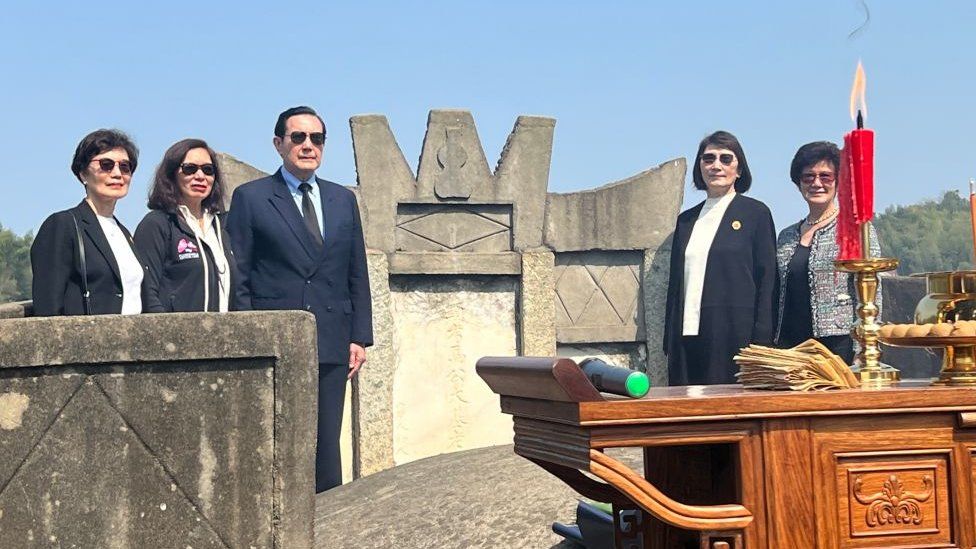
But the elephant in the room is the deteriorating relationship between Taiwan's two suitors - Washington and Beijing. That relationship is worse today than at any time since the US and China officially recognised each other in 1979, says Bonnie Glaser, head of the Asia programme at the German Marshall Fund of the United States.
"They [Beijing] are not taking calls from President Biden or the Pentagon. Congress has declared China an existential threat," she says.
For decades Washington has managed a rather delicate status quo, acknowledging, if not supporting, Beijing's position that there is only one Chinese government - the one on the mainland. It has maintained official ties with that government, and not Taiwan, since 1979. But it has also remained a steadfast ally to Taipei, guaranteeing to help the island defend itself.
But the fear is that China now believes that the US is set on changing the status quo which has helped keep the peace in the Taiwan Strait for the last 40-odd years.
"President Biden told Xi Jinping he is not using Taiwan as a weapon, that he does not support the separation of Taiwan from China," Ms Glaser says.
But such assurances are unlikely to amount to much in the wake of contentious state visits or official meetings with Taiwan's leaders, she adds.
So while Mr Ma tours China and Ms Tsai has tea in California, what Taiwan also needs is for Mr Xi to pick up the phone.




